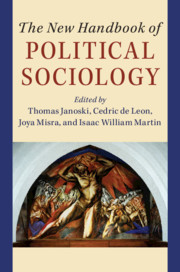Book contents
- The New Handbook of Political Sociology
- The New Handbook of Political Sociology
- Copyright page
- Dedication
- Contents
- Tables
- Figures
- Contributors
- Acknowledgments
- Introduction
- I Theories of Political Sociology
- II Media Explosion, Knowledge as Power, and Demographic Reversals
- III The State and Its Political Organizations
- IV Civil Society: The Roots and Processes of Political Action
- V Established and New State Policies and Innovations
- VI Globalization and New and Bigger Sources of Power and Resistance
- 36 Global Political Sociology and World-Systems
- 37 Liberalizing Trade and Finance
- 38 The Racial State in the Age of Racial Formation Theory and Beyond
- 39 Democracy and Autocracy in the Age of Populism
- 40 Transnational Social Movements
- Index
- References
36 - Global Political Sociology and World-Systems
from VI - Globalization and New and Bigger Sources of Power and Resistance
Published online by Cambridge University Press: 22 February 2020
- The New Handbook of Political Sociology
- The New Handbook of Political Sociology
- Copyright page
- Dedication
- Contents
- Tables
- Figures
- Contributors
- Acknowledgments
- Introduction
- I Theories of Political Sociology
- II Media Explosion, Knowledge as Power, and Demographic Reversals
- III The State and Its Political Organizations
- IV Civil Society: The Roots and Processes of Political Action
- V Established and New State Policies and Innovations
- VI Globalization and New and Bigger Sources of Power and Resistance
- 36 Global Political Sociology and World-Systems
- 37 Liberalizing Trade and Finance
- 38 The Racial State in the Age of Racial Formation Theory and Beyond
- 39 Democracy and Autocracy in the Age of Populism
- 40 Transnational Social Movements
- Index
- References
Summary
World-systems analysis is a holistic and critical social science approach that proposes the study of social change focusing on whole systemic human interaction networks. The general theoretical approach is based on institutional materialism that is inspired by classical sociology and anthropology (Chase-Dunn and Lerro 2016). The world-system perspective emerged in the 1960s and 1970s to explicate the nature of the core–periphery hierarchy over the last five centuries.
Keywords
- Type
- Chapter
- Information
- The New Handbook of Political Sociology , pp. 953 - 972Publisher: Cambridge University PressPrint publication year: 2020
References
- 1
- Cited by

